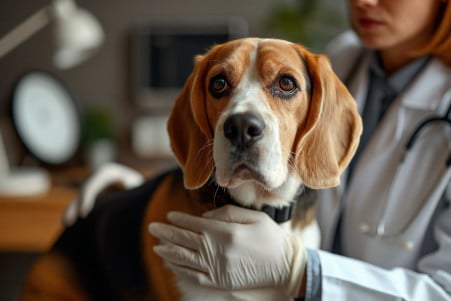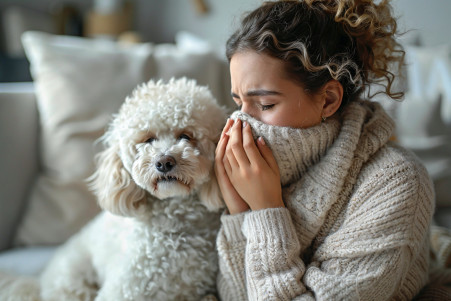Why Does My Dog’s Breath Smell Like Fish? Uncovering the Causes
14 March 2024 • Updated 13 March 2024

If you’ve ever noticed that your dog’s breath smells like fish, you may wonder if it’s just a harmless quirk or if it’s something more serious. The most common reasons for fishy-smelling dog breath are dental problems, anal gland issues, and dietary issues.
Bacteria that accumulate due to dental disease can cause bad breath. Meanwhile, anal sac secretions can cause a fishy smell if they are expressed near the mouth. Read on to learn more and find out how to get your dog the help they need.
In this investigation, we will summarize expert insights from veterinarians and research in the fields of animal health and nutrition. We will also discuss research on topics such as canine dental care, the role of anal glands, and how diet impacts a dog’s mouth. Our goal is to help you better understand the factors that contribute to your dog’s fishy breath and provide research-based tips to help you resolve this issue.
Why does my dog's breath smell like fish?
Periodontal Disease and Canine Bad Breath
When we talk about bad breath in dogs, it’s impossible not to talk about their dental health. Periodontal disease (PD) is a common problem in our furry friends and is characterized by inflammation of the tissues that surround the teeth.
As noted in a review in Antibiotics, the prevalence of periodontal disease in dogs ranges from 44% to 100% in certain populations, with prevalence varying widely based on age and size of the dog. The metabolites produced by the bacteria in dental plaque are the main cause of the bad smell.
Because periodontal disease is so common, it has a big impact on a dog’s oral health. The bacterial metabolites can cause bad breath, often described as fishy. In fact, an article in ScienceDirect notes that if periodontal disease is left untreated, it can lead to not only oral but also systemic issues including heart, kidney, and liver disease.
Preventative measures, including regular tooth brushing and professional dental cleanings, are important to help manage the condition. In fact, a study from PubMed notes that focusing on breeds and individual dogs that are at the highest risk can help make interventions more effective.
It’s also important to make sure that dental chews and treats that help remove plaque mechanically are used in addition to these other interventions to help fight periodontal disease and the fishy breath that comes with it, and in turn help our pets have not only fresher breath but better health overall.
How Diet Impacts Your Dog’s Fishy Breath
Diet has a lot to do with how fresh your dog’s breath is. Not only can certain foods lead to bad breath, but the way your dog eats can also impact their oral health.
A 2023 study by Smith et al. in the Journal of Veterinary Internal Medicine explains that dietary management is important in controlling periodontal disease, which is one of the most common causes of fishy breath in dogs. The kind of food, as well as the texture and nutritional content of the food, can all impact the plaque and tartar that causes bad breath.
To nutritionally manage bad breath, make sure that your dog is eating a well-balanced diet that meets the standards set by the American Association of Feed Control Officials (AAFCO), as the VIN study points out. In addition, dental diets and treats with the Veterinary Oral Health Council (VOHC) Seal of Acceptance can help manage plaque and tartar, which will help improve your dog’s breath.
A study published in PMC also found that daily tooth brushing and dental treats can help maintain oral health, which directly impacts how fresh your dog’s breath is. Pet parents should make sure that they’re brushing their dog’s teeth and giving them dental treats to help improve their oral health and, in turn, help reduce the fishy smell of their breath.
These dietary changes and consistent oral care will make a big difference in your dog’s oral and overall health.
Understanding the Connection Between UTIs and Fishy Breath in Dogs
While not as immediately apparent as dental problems or dietary reasons, urinary tract infections (UTIs) in dogs can also lead to fishy breath. In addition to causing bad breath, a UTI in a dog can cause frequent urination, discomfort, and licking of the genital area, which can lead to oral contact with bacteria in the urine.
The bacteria that cause UTIs, especially Escherichia coli (E. coli), can also be found in the mouth, which can affect a dog’s breath.
Veterinarians will often use diagnostic tests like urinalysis or urine cultures to determine if a dog’s bad breath is due to a UTI. A study in the Journal of Veterinary Internal Medicine explains that it’s important to know which bacteria are causing the infection and which antibiotics they are susceptible to in order to treat a UTI effectively.
The study also emphasizes the importance of responsible antibiotic use to prevent resistance and suggests regular culture and susceptibility testing.
Not only is it important to manage UTIs in dogs, but it’s also important to manage the problem of antimicrobial resistance in UTIs, which is a growing issue, according to a study in PMC. By understanding UTIs in dogs, we can help manage a variety of symptoms, including the mysterious fishy breath, and help ensure their overall health and happiness.
Anal Sac Issues and Fishy Dog Breath
Dogs’ anal sacs are located on either side of the rectum and are important for scent marking and communication. The sacs produce a smelly liquid that dogs use to mark their territory and communicate with other dogs.
However, impaction, infection, or inflammation (anal sacculitis) can cause a fishy smell to come from a dog’s anal area. When dogs lick or groom themselves, the liquid from the sacs can be transferred to their mouths, leading to bad breath.
A cross-sectional study in PubMed found that the prevalence of non-neoplastic anal sac disease in dogs is 15.7% and looked at the incidence and management of the condition. Another study in PubMed found that obesity and certain breeds are predisposing factors for anal sac issues. Vets typically treat the condition by expressing the sacs manually or surgically removing them in severe cases.
A study in Veterinary Dermatology found that local treatment is effective for canine anal sacculitis. Most cases are resolved with interventions like flushing and infusion with medicated solutions, and local treatment protocols have been found to be effective. To prevent the condition from coming back, it’s important to treat any underlying issues and make sure dogs have regular vet visits.
Dog owners should know about anal sac issues, not only for their dogs’ well-being but also because they can cause bad breath. With proper treatment and preventive care, anal sac issues and the fishy smell that comes with them can be managed, which will help ensure that our dogs are as healthy and happy as possible.
What’s Causing Your Dog’s Fishy-Smelling Breath?
In the search to find out what causes fishy-smelling breath in dogs, we’ve found four main reasons: dental health, diet, urinary tract infections, and anal glands. Each of these issues contributes to the smell in different ways and shows how a dog’s health and dental care are closely related.
Dental health is a big factor, and studies have shown that periodontal disease has a major impact on dogs. This is why it’s important to brush your dog’s teeth and have them professionally cleaned to keep bacteria from building up. Diet also has a big impact, and studies have shown that certain diets can help prevent and cause bad breath in dogs, according to the Journal of Veterinary Internal Medicine.
Urinary tract infections, while less direct, can also cause fishy-smelling breath. It’s important for vets to catch and treat UTIs early to keep them from spreading. Similarly, anal gland problems that go untreated can also cause bad breath, so it’s important to manage and prevent these issues.
It’s important to see a vet to get an accurate diagnosis and treatment plan. However, it’s also important to take preventive measures like regular check-ups, good dental care, a healthy diet, and good overall health to make sure you can get rid of fishy-smelling dog breath for good.
Knowing these causes not only helps us find ways to freshen our dog’s breath but also shows how important it is to take a holistic approach to our dogs’ health. As pet parents, it’s our job to make sure our dogs are healthy, and that starts with taking care of even the smallest issues like fishy breath.


